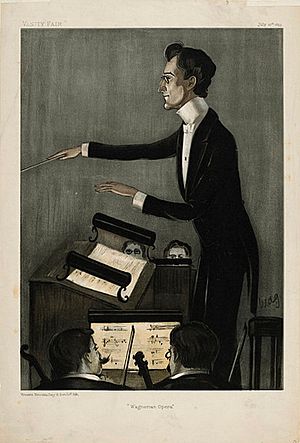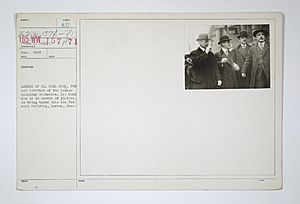Karl Muck facts for kids
Karl Muck (born October 22, 1859 – died March 3, 1940) was a famous conductor of classical music. He was born in Germany but spent most of his career in Europe, especially conducting operas. He also worked with the Boston Symphony Orchestra (BSO) in the United States.
During World War I, Muck faced a difficult time. In 1917, a newspaper editor wrongly accused him of refusing to play the American national anthem, "Star Spangled Banner." Even though Muck was a citizen of neutral Switzerland, he was arrested. He was held in a camp in Georgia from March 1918 to August 1919. After this, Karl Muck and his wife were sent out of the United States. Later, he had important conducting jobs in Hamburg and at the Bayreuth Festival.
Contents
Early Life and Musical Journey
Karl Muck was born in Darmstadt, Germany. His father was a court official and loved music. In 1867, his family moved to Switzerland, and Karl became a Swiss citizen when he was 21.
Karl started playing piano as a child. He performed his first piano solo at age 11. He also played the violin in a local orchestra. He studied at the University of Heidelberg at 16 and later earned a degree from the University of Leipzig in 1880. While there, he also studied music at the Leipzig Conservatory. He made his official debut as a concert pianist in 1880.
He began his conducting career in smaller cities in 1880. He worked in Zurich, Salzburg, Brünn, and Graz. In 1887, he married Anita Portugall. His first big job was in Prague in 1886. He also conducted Wagner's famous "Ring" cycle in Moscow and St. Petersburg.
In 1892, he became the main conductor of the Berlin Court Opera. He stayed there until 1912. During his time in Berlin, he conducted over 1,000 opera performances. He also led the Royal Orchestra in concerts.
Muck took on other important roles. He was a guest conductor at music festivals in Germany. In 1899, he conducted several of Wagner's operas in London. He spent many summers at the Bayreuth Festival, a famous Wagner festival. He became the main conductor there in 1903. He conducted Wagner's "Parsifal" at 14 Bayreuth festivals between 1901 and 1930. He also conducted the Vienna Philharmonic from 1903 to 1906. From 1906 to 1918, he led the Boston Symphony Orchestra. He also visited and conducted in cities like Paris and Copenhagen.
Muck's Conducting Style
Musicians who worked with Karl Muck admired him greatly. The famous pianist Artur Schnabel called Muck "a very great master." Another pianist, Paderewski, said Muck was "an ideal accompanist."
Muck's conducting style was very precise. He used only small movements with his baton. He was known for being very true to the musical score. He didn't try to add his own personal touch too much. Instead, he focused on showing the composer's original ideas.
However, orchestra players sometimes found him impatient and impulsive. He was always very serious during concerts. The Austrian conductor Karl Böhm said that Muck taught him how to conduct Wagner's music. Muck showed him how to make the orchestra sound best and how to use the special acoustics at Bayreuth.
Leading the Boston Symphony Orchestra
Muck was the music director of the Boston Symphony Orchestra (BSO) from 1906 to 1908 and again from 1912 to 1918. When he first started, he had to learn more types of music. In Europe, he mostly conducted operas and German music. In Boston, he expanded his repertoire to include French works.
He also introduced new music to Boston audiences. He conducted the first American performance of Schoenberg's "Five Pieces for Orchestra." He also brought symphonies by Sibelius and many works by Debussy to Boston. Even though his style was usually controlled, he sometimes showed a romantic side, like in Liszt's "Faust Symphony." After his death, the New York Times said that he built a "virtuoso orchestra" in Boston.
In 1916, a music group called Phi Mu Alpha Sinfonia made him an honorary member. In October 1917, he led the BSO in making historic recordings. These recordings were for the Victor Talking Machine Company and included music by Tchaikovsky, Beethoven, and Wagner.
Philip Hale, a music critic, described Muck during his time in Boston. He wrote that Muck stood calmly and gracefully. He was a powerful and magnetic person, even when still. Hale said that the orchestra was Muck's way of expressing the composer's music.
Unjust Internment During World War I
On March 25, 1918, Karl Muck was arrested. This happened just before he was supposed to conduct Bach's "Saint Matthew Passion." Government officials arrested him because he was born in Germany, even though he was a Swiss citizen. Police also searched his home and took his papers. They wrongly thought his musical notes were secret codes.
Muck was held at Fort Oglethorpe in Georgia. He stayed there until August 21, 1919. Then, he and his wife were put on a ship to Copenhagen. The music fraternity that had honored him earlier removed him as a member.
Other people held at the camp convinced Muck to conduct for them. He had said he would never conduct in America again. But he led 100 musicians in a performance of Beethoven's "Eroica" symphony. It was a powerful moment for everyone there.
When he left New York, Muck told reporters he was not German and considered himself American. But he was upset with the American news media for treating him unfairly. He also worried about the Boston Symphony Orchestra, as many of its musicians had also been held. After being sent away, Muck never returned to the United States.
Later Career and Final Years
After his internment, Muck returned to a Germany that had changed a lot. His wife, Anita, passed away in 1921, which made him very sad.
In 1922, Muck became the leader of the Hamburg Philharmonic Orchestra. He also made more recordings. He returned to the Bayreuth Festival when it started again in 1924. He was very dedicated to the festival and Wagner's music. He also conducted in Munich, Amsterdam, and Salzburg.
In 1930, he resigned from Bayreuth. He felt that the festival needed someone with newer ideas. In 1933, he also left his position in Hamburg. He was uncomfortable with the Nazi government's control over music.
His last major public performance was in February 1933. It was a concert in Leipzig celebrating 50 years since Wagner's death. Adolf Hitler was in the audience. His very last concert was in May 1933 with the Hamburg Philharmonic. In 1939, on his 80th birthday, he received an award from Adolf Hitler.
Karl Muck spent his final years in Stuttgart, Germany. He was partially paralyzed and studied Eastern philosophy. He passed away on March 3, 1940, at the age of 80. When the Boston Symphony Orchestra heard the news, they stopped their rehearsal to honor him. The singer Geraldine Farrar wrote that Muck was "bitterly and unjustly assailed" during the anthem controversy. She said he knew nothing of the request. She also said that Muck considered his years with the Boston Symphony Orchestra among his happiest.
Recordings
Karl Muck's musical legacy lives on through his recordings. In October 1917, he made recordings in the U.S. with the Boston Symphony Orchestra. These were for the Victor Talking Machine Company. The orchestra was recorded at its full size, which was unusual for that time. They recorded short pieces from works by Beethoven, Tchaikovsky, and Berlioz.
His most important recordings were made later. In 1927, he recorded excerpts from Wagner's "Parsifal" at the Bayreuth Festival. People still consider his control of the music in these recordings to be outstanding. In December 1927, he led the Berlin State Opera Orchestra in a recording of the "Parsifal" Prelude. A year later, he made a nearly complete recording of the third act of "Parsifal." Music critics have called this one of the greatest Wagner performances ever recorded. In total, about 40% of the opera was recorded. He also recorded other Wagner orchestral pieces with the Berlin State Opera Orchestra. These recordings have been re-released on CDs.
Some radio recordings of Muck conducting also exist. These include pieces by Wagner and Bruckner.
In Popular Culture
In the 2018 film De Dirigent (The Conductor), Karl Muck was played by German actor Richard Sammel. This movie is about Antonia Brico, who was Muck's student and became the first internationally recognized female conductor.
See also
 In Spanish: Karl Muck para niños
In Spanish: Karl Muck para niños
 | John T. Biggers |
 | Thomas Blackshear |
 | Mark Bradford |
 | Beverly Buchanan |



